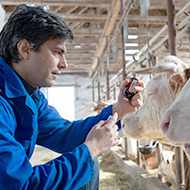NOAH has expressed frustration over the latest Government delays to the new UK Veterinary Medicines Regulations.
NOAH calls on the Government to expedite the planned consultation.
Animal health firm NOAH has called on the Government to accelerate plans for a public consultation on the new UK Veterinary Medicines Regulations (VMR).
First published in 2013, the VMR sets out the legal text on the manufacture, authorisation, marketing, distribution and post-authorisation surveillance of veterinary medicines.
Following Britain's exit from the EU, the regulations are currently under review, with the proposed changes expected to undergo a formal public consultation by the end of 2022. However, this has now reportedly been pushed back to the New Year.
Until the revised VMR comes into force, there exists what the VMD calls an "airgap" between the EU Legislation and the current VMR. Dawn Howard, CEO of NOAH, warned that further delays to the legislation put animal health firms in a state of limbo and could cause UK animals to "miss out."
“Our members’ UK animal health businesses continue in a climate of uncertainty which impacts on their ability to plan for investment here,” she said. “They are operating under regulations based on a now-superseded EU Directive and are unable to benefit from the improvements to encourage innovation and drive down unnecessary administrative burden seen in other regions.
“The animal health industry provides technical expertise, R&D and innovation in the UK to protect people, animals and the environment; NOAH members need a regulatory framework that can enable the UK animal health sector to thrive. The opportunity is there, through the UK VMR review, for UK Government to support competitiveness and increase the availability of veterinary medicinal products to British livestock and companion animals.
Dawn continued: “We call on the Government to stop the delays: to expedite the consultation to enable stakeholders to share views and then to bring forward revised legislation, so our sector can continue to provide the veterinary medicines needed to prevent and treat disease in the UK’s animals, helping secure our food supply, as well as supporting the Governments scientific ambitions through innovation in our sector.”







 Birmingham Dogs Home has issued an urgent winter appeal as it faces more challenges over the Christmas period.
Birmingham Dogs Home has issued an urgent winter appeal as it faces more challenges over the Christmas period.
